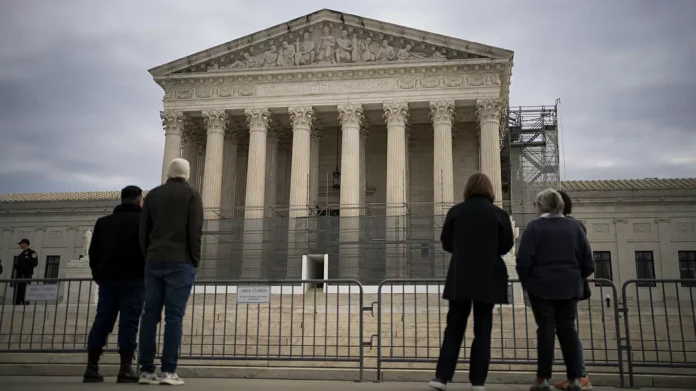The Supreme Court of the United States was faced with a crucial decision on Wednesday, as they heard arguments in the case of Nuclear Regulatory Commission v. Texas. The case revolves around the question of whether the federal Nuclear Regulatory Commission (NRC) has the authority to license private, temporary offsite storage of nuclear waste. This issue has been a contentious one, with strong opinions on both sides.
The case was brought to the Supreme Court after an appeals court vacated an NRC license for a planned waste storage facility in Texas. The facility had been met with opposition from the state of Texas and its residents, who had raised concerns about the safety and environmental impact of storing nuclear waste in their state.
The NRC argued that they have the authority to license private, temporary offsite storage of nuclear waste under the Atomic Energy Act. However, the state of Texas and its supporters argued that the responsibility for waste management should fall on the federal government, not individual states.
During the oral arguments, the Supreme Court appeared to be split on the issue. Some justices expressed concern over the potential risks associated with storing nuclear waste in temporary facilities, while others questioned the NRC’s authority to license such facilities.
This case is of great significance as it not only affects the state of Texas, but also has implications for the entire country. The decision made by the Supreme Court will have far-reaching consequences for the management of nuclear waste in the United States.
At the heart of this case is the question of who should bear the responsibility for the safe storage of nuclear waste. The federal government has long been responsible for regulating the nuclear industry, but the issue of waste management has been a contentious one. The NRC argues that they have the expertise and authority to license temporary storage facilities, while the state of Texas argues that the federal government should take on this responsibility.
The state of Texas has a valid concern about the potential risks associated with storing nuclear waste in their state. The planned facility would be located near a major river and close to residential areas, raising concerns about the safety of the surrounding communities. Additionally, there are concerns about the long-term effects of storing nuclear waste in temporary facilities and the potential for accidents or leaks.
On the other hand, the NRC argues that temporary offsite storage is a necessary solution to the growing problem of nuclear waste. With no permanent storage facility in place, nuclear waste is currently being stored on-site at nuclear power plants, which poses its own set of risks. The NRC believes that temporary offsite storage is a safer and more practical solution until a permanent storage facility can be established.
The Supreme Court’s decision in this case will have a significant impact on the future of nuclear waste management in the United States. If the NRC’s authority to license temporary offsite storage facilities is upheld, it could pave the way for more facilities to be built in other states. However, if the state of Texas prevails, it could mean that the federal government will have to take on a larger role in waste management.
Regardless of the outcome, it is clear that the issue of nuclear waste management needs to be addressed. The United States currently has over 80,000 metric tons of nuclear waste, and without a permanent solution in place, this number will continue to grow. It is imperative that the federal government and individual states work together to find a safe and sustainable solution for the management of nuclear waste.
In conclusion, the Supreme Court’s decision in Nuclear Regulatory Commission v. Texas will have a significant impact on the future of nuclear waste management in the United States. It is a complex issue with valid arguments on both sides, and the decision will not be an easy one. However, it is crucial that the safety of the public and the environment is taken into consideration when making this decision. Let us hope that the Supreme Court will come to a fair and just decision that will benefit the country as a whole.

